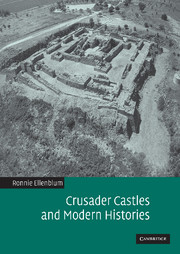Book contents
- Frontmatter
- Contents
- List of illustrations
- List of tables
- Acknowledgements
- Part I National discourse and the study of the Crusades
- Part II Crusader studies between colonialist and post-colonialist discourse
- 4 Colonial and anti-colonial interpretations
- 5 Who invented the concentric castles?
- 6 ‘Crusader cities’, ‘Muslim cities’, and the post-colonial debate
- 7 Crusader castle and Crusader city: is it possible to differentiate between the two?
- Part III Geography of fear and the spatial distribution of Frankish castles
- Part IV The castle as dialogue between siege tactics and defence strategy
- Conclusion
- Appendix
- Bibliography
- Author index
- Subject index
4 - Colonial and anti-colonial interpretations
Published online by Cambridge University Press: 29 July 2009
- Frontmatter
- Contents
- List of illustrations
- List of tables
- Acknowledgements
- Part I National discourse and the study of the Crusades
- Part II Crusader studies between colonialist and post-colonialist discourse
- 4 Colonial and anti-colonial interpretations
- 5 Who invented the concentric castles?
- 6 ‘Crusader cities’, ‘Muslim cities’, and the post-colonial debate
- 7 Crusader castle and Crusader city: is it possible to differentiate between the two?
- Part III Geography of fear and the spatial distribution of Frankish castles
- Part IV The castle as dialogue between siege tactics and defence strategy
- Conclusion
- Appendix
- Bibliography
- Author index
- Subject index
Summary
In the previous chapters I have shown how nationalist discourse and colonialist ways of thinking conditioned and reshaped the historiography of the Crusades and set a different agenda for Crusader studies. However, whereas the introduction of nationalist discourse is almost obvious, and certainly not unique to the history of the Crusades, the introduction of colonial discourse is not as clear and univalent.
Thus, if the appropriation of the all-European endeavour by French historians, or the turning of Godfrey of Bouillon into a Belgian national hero, could easily be understood as emanating from nineteenth-century nationalist discourse, the colonialist discourse is much more evasive and therefore more difficult to define. All references to the ‘other’, the ‘foreigner’, the ‘native’, or the ‘local’ are open to diverse interpretations.
In the following chapters I shall attempt to argue that several of the most important and fundamental research issues raised in Crusader historiography, as well as some of the answers to these questions, were already formulated in the nineteenth and early twentieth centuries, and that many of them were influenced by hidden colonialist values. These values do not always correspond to the negative images usually associated with pro-colonialist writing, and are manifested also in the writings of those who expressed overt anti-colonialist sentiments. In any event I believe that one fundamental question, the issue of the relationships between European settlers and local residents, which had already been raised during the second half of the nineteenth century, will best clarify the introduction of the colonial discourse to the history of the Crusades.
- Type
- Chapter
- Information
- Crusader Castles and Modern Histories , pp. 43 - 61Publisher: Cambridge University PressPrint publication year: 2007



